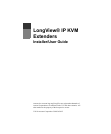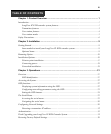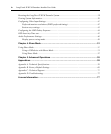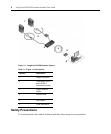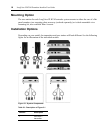
Chapter 1: Product Overview 3
• The other is a high-speed port that is used for virtual media (mass storage devices) peripheral
devices or other USB devices interfacing with the target computer, along with providing power
for the LVIP-T transmitter.
NOTE: The LVIPDH-T and LVIPHR-T transmitters provide a single USB interface, and use an integrated hub
within the transmitter.
Video
Video of 24-bit color depth up to a resolution of 1280 x 1024 at 60 Hz is supported by the LVIP-R
user station and LVIP-T transmitter. Both CRT and flat-panel LCD monitors are supported, and
can be connected to the LongView IP KVM extender system via a DVI-I video connector. VGA
monitors can be attached to the system by using a DVI to VGA adaptor. The system supports DDC
version 2B.
The LVIPHR-R user station and LVIPHR-T transmitter support 24-bit color depth up to a
resolution of 1920 x 1200 at 60 Hz. Both DVI-D and VGA video sources are supported at the
transmitter via a dual connector, allowing the user to choose the appropriate video source.
The LVIPDH-R user station and LVIPDH-T transmitter also support 24-bit color depth up to a
resolution of 1920 x 1200 at 60 Hz. DVI-D computer video sources are supported at the transmitter.
Since DVI-I is supported at the user station, a VGA adaptor can be used to connect to a VGA
monitor.
Both the LVIPHR-R and LVIPDH-R user stations feature support for 1680 x 1050 at 60 Hz.
Transmitter features
The LongView IP KVM transmitter connects externally to the video, audio and USB ports of the
target computer.
The LVIP-T transmitter is attached directly to the target computer and draws its power directly
from two USB ports on the target computer. The LVIPDH-T and LVIPHR-T transmitters are
powered by an external power supply.
The transmitter captures, compresses and encrypts the target computer’s media streams and
transmits them to the user station over a standard TCP/IP network.
Interoperability
The LVIPHR-T and LVIPDH-T transmitters are compatible with each other, enabling users with
combined single and dual video computers to gain access from either a single or dual display desks.
NOTE: The LVIPHR-R and LVIPDH-R user stations will only show a single A channel video of the LVIPHR-T and
LVIPDH-T transmitters, respectively.





